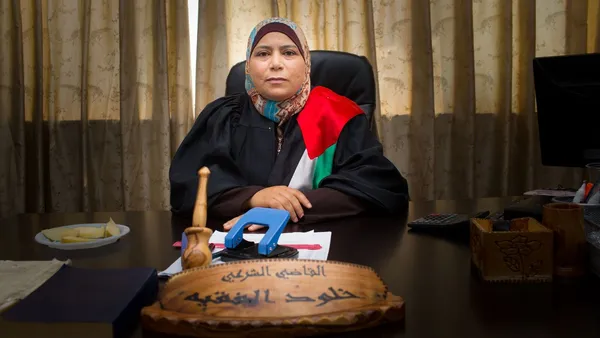Eye For Film >> Movies >> The Judge (2017) Film Review
The Judge
Reviewed by: Amber Wilkinson

If you think US Supreme Court justice Ruth Bader Ginsburg is a ground breaker, wait till you take a look at the career of Palestinian Kholoud Al-Faqih. A lawyer with ambition, she became, not without struggle, the first female judge to be appointed to the Shari'a (Islamic) law courts. Palestine operates a multiple court system, with the civil courts - which have long had women judges - dealing with everything from land disputes to contract law, while the Shari'a courts are mainly concerned with family issues, such as divorce, child custody and alimony.
Erika Cohn takes a pacy approach to her subject, following Al-Faqih as she goes about her daily work settling disputes between estranged husbands and wives, while examining her motivations through interviews, at the same time as painting a broader picture regarding the status of women in Palestine. Speaking about her desire to rise to the top, Al-Faqih says she wanted to "throw a rock to stir these stagnant waters".

Although some scholars spoke out about the possibility of women ascending to the role of judge - and Husam Al-Deen Afanah, a prominent opposing voice is given space to make the case here - what quickly emerges is a story all too familiar to women everywhere, the cultural bias towards inequality.
"The problem is women don't know their rights," Al-Faqih insists, an attitude which, it emerges, was passed down to her by her dad, who as he explains how he sent all his daughters to university adds: "For a woman, education is their weapon."
Religion can often become the whipping boy for problems, especially in conversations about the Middle East, but Kohn's documentary shows how the real issue lies in the sexist traditions not Islam - attitudes that often mean women are forced to stay with abusive husbands even though the law is on their side. It is possible, for example, to add clauses to a marriage contract making it very difficult for a man to take additional wives, even though it is legal under Shari'a law, but few women seem aware of the strength of their rights.
Vox pops show how this bias runs deep. Asked about judges, one woman notes that men are "scientifically" better, while one of Al-Faqih's fellow male judges expresses the worrying opinion that, "No man would ever cause problems with his wife". Against this backdrop, Al-Faqih is a positive dynamo, dispensing justice and her opinion in an equally no-nonsense fashion. Kohn makes good directorial choices that stop the film from getting bogged down in debate, intercutting interviews, so that they seem more like a dialogue, following Al-Faqih as she walks about to avoid the 'talking head' feel and inserting aerial footage to bolster the sense of movement.
Kohn also captures the 'two steps forward and one step back' dynamic that often accompanies progress towards equality, showing how hard won rights can easily be eroded. Al-Faqih, however, is not for turning and this documentary could well lead to her being an inspiration, not just for other women in Palestine, but for youngsters much further afield.
Reviewed on: 22 Nov 2018

















